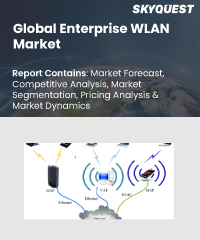
Report ID: SQMIG50C2025

Report ID:
SQMIG50C2025 |
Region:
Global |
Published Date: June, 2024
Pages:
260
|
Tables:
95 |
Figures:
76
The market for enterprise WLAN is highly saturated and highly competitive on the global level due to the fact that its value chain is invested heavily in key players seeking to dominate the market. It has players who have broad product offerings and who have operations all over the world making it hard for the other players into the market. These firms effectively utilize their consolidated R&D strengths to develop and launch new and better WLAN solutions that meet the specific needs of enterprises in terms of high-quality WLAN links. Furthermore, there are new entrants that are entering the market with unique market segments or unique technologies, which are usually targeted at verticals segments or new technology such as cloud-based WLAN solutions. Over the years, vendor cooperation in this market is high since it encourages technology adoption and the expansion of coverage. This is driven by the continuous enhancement of BYOD policies in the market, demand for a seamless connection, and the enhanced internet of things application, which requires a strong and efficient wireless LAN that is capable of handling dense traffic data in a secure manner.
Our industry expert will work with you to provide you with customized data in a short amount of time.
REQUEST FREE CUSTOMIZATIONWant to customize this report? This report can be personalized according to your needs. Our analysts and industry experts will work directly with you to understand your requirements and provide you with customized data in a short amount of time. We offer $1000 worth of FREE customization at the time of purchase.

Report ID: SQMIG50C2025